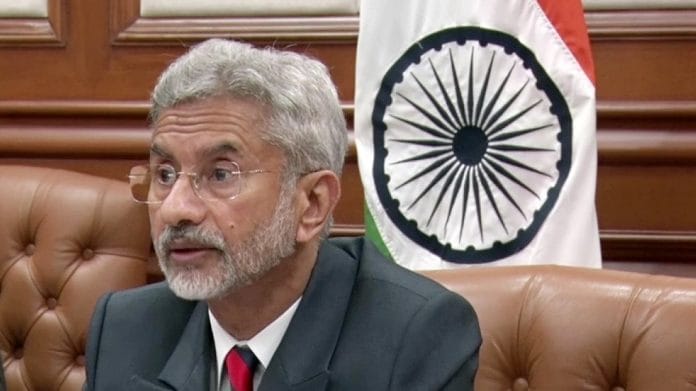New Delhi: Days after the second in-person Quad Summit was held in Tokyo, External Affairs Minister S. Jaishankar has argued that the grouping meant not giving other countries a “veto” on India’s choices.
In an op-ed for Hindustan Times Thursday, the foreign minister wrote about the evolution of Quad since its “abortive start” in 2007, its revival in 2017 and where it stands now.
He argued that for India, much of that process has involved “overcoming” the “hesitations of history”. “Equally, it has meant not giving other countries a veto on our choices,” he wrote.
On 24 May, the Quad leaders — Indian Prime Minister Narendra Modi, US President Joe Biden, Japanese Prime Minister Fumio Kishida and Australia’s newly-elected Prime Minister Anthony Albanese — met in Tokyo for the Quad summit.
‘Most productive summit to date’
According to Jaishankar, the Tokyo Summit was the “most productive” one so far as it notably saw a commitment by Quad members to extend over $50 billion of infrastructure assistance and investment in the Indo-Pacific over the next five years.
“The Tokyo Summit is the most productive to date, underlining both the distance that Quad has travelled and its potential for future growth,” wrote the minister.
He also outlined what new collaborations the Quad is working on in the areas of tech, climate action, disaster prevention, counter-terrorism and preventing “illegal fishing”.
With regard to tech, the Quad is focusing on “critical and emerging technologies, encouraging a diverse and open telecom ecosystem” and working on a semiconductor value chain, wrote Jaishankar.
“Counter-terrorism and cyber security are also prominent in their expanding scope,” he added.
On the climate front, he wrote about how the grouping is promoting green shipping practices, supports cooperation on green hydrogen and is working to develop “Q-CHAMP” (Quad climate change and adaptation mitigation package).
“Given the pandemic, it is natural for Quad to advance a vaccine partnership,” he wrote, adding that the grouping is also focusing on humanitarian assistance and disaster response, given the history of tsunamis and other natural disasters in the region.
On education, the minister spoke highly of the STEM fellowship, a first-of-its-kind scholarship programme launched by the Quad at the Tokyo Summit and which seeks to fund 100 American, Australian, Indian and Japanese students in their pursuit of advanced courses in science and technology at US universities.
On illegal fishing, Jaishankar wrote, “The Indo-Pacific Partnership for Maritime Domain Awareness will bring together regional information fusion centres to address challenges like natural disasters and illegal fishing.”
China is reportedly the source of 80-95 per cent of illegal fishing in the Indo-Pacific. The ‘Indo-Pacific Partnership for Maritime Domain Awareness’ (IPMDA) plans to use satellite imagery and technology to combat illegal fishing and “dubious operations” of the Chinese maritime militia.
‘Rise of Asia’
Jaishankar described the growing Quad grouping as a reflection of the “rise of Asia” as well as “the repositioning of big powers”.
“These are truly contemporary concepts that reflect the rise of Asia, the repositioning of big powers, their changed capabilities and approaches, the nature of supply chains and the criticality of technology and connectivity,” wrote the minister.
He added, “From an Indian perspective, it is also a statement of its growing interests beyond the Indian Ocean. What began as a solution for an economic crisis in 1992 has developed into a strategic correction.”
‘Major diplomatic accomplishment of Modi govt’
In his piece, the external affairs minister also emphasised that “the firm establishment of Quad” is one of the major diplomatic accomplishments of the Modi government.
India’s place within the grouping makes sense given its “growth, confidence, and worldview”, he added.
In his piece, the minister also sought to distance the Quad from the Cold War.
“Some critics of Quad have deliberately sought to evoke the imagery of the Cold War. Nothing could be further from the truth,” he wrote.
“It is precisely because the Cold War ended that India’s partnerships with the United States, Japan and Australia could realise their real potential,” he added.
Also read: ‘Force for good’ — Quad sends message of solidarity amid Russia invasion, China challenges






